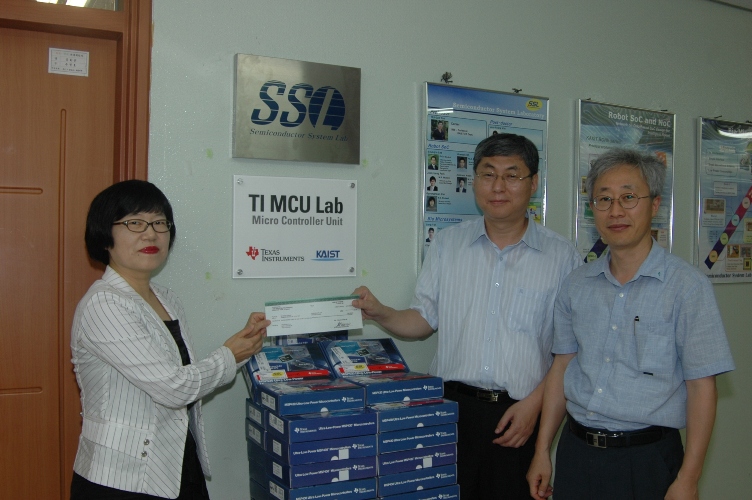people
Professor Hai-Joon Yoo from the Electrical Engineering Department of KAIST made a research collaboration agreement with Texas Instruments (TI), Inc. in July 2010 to develop a “Many-core Processor Chip,” a chip that is designed to emulate a human brain.
TI, Inc. is an American company based in Dallas, Texas and renowned for developing and commercializing semiconductor and computer technology. The company is the 4th largest manufacturer of semiconductors worldwide, 2nd supplier of chips for cellular handsets, and 1st producer of digital signal processors and analog semiconductors, among a wide range of semiconductor products.
TI, Inc. has designated Professor Yoo’s lab as one of its official labs and promised to give financial supports for the lab—it has pledged to donate a total value of 300 million won of research fund and equipment to Professor Yoo. On July 21, 2010, the signboard hanging ceremony for the designation of a TI Lab was held at Professor Yoo’s lab.
Professor Yoo developed a neuro-circuit network to emulate a human brain by adopting a mixed mode circuit that has chips for analog and digital circuits. He then has conducted a research to graft the mixed mode circuit onto a Many-core Processor to integrate the human intelligence into a conventional single-core processor that can process one instruction at a time. The Many-core Processor, once developed, can be applied to various kinds of products such as an artificial intelligence surveillance camera, robot, smart car, and the like.
Professor Yoo has presented his research results at numerous international meetings and conferences, among other things, the International Solid-State Circuits Conference (ISSCC), a global forum sponsored by the Institute of Electrical and Electronics Engineers (IEEE) for presentation of advances in solid-state circuits and Systems-on-a-Chip. The Conference offers a unique opportunity for engineers working at the cutting edge of IC design to maintain technical currency, and to network with leading experts.
Professor Yoo is a senior member of IEEE and Chairman of ISSCC in Asia.

-
policy Cyber MOU Signing with Zhejiang University
KAIST signed an MOU with Zhejiang University (ZJU) in China on March 25. This MOU signing ceremony took place via video conference due to the outbreak of COVID-19. The collaboration with ZJU had already started with the signing of an MOU for cooperation in technology commercialization last December. Possible cooperation initiatives included facilitating joint start-up businesses, patent portfolios, and technology marketing. With this general agreement signing, it is expected that the two ins
2020-03-30 -
policy KAIST-Google Partnership for AI Education and Research
Google has agreed to support KAIST students and professors in the fields of AI research and education. President Sung-Chul Shin and Google Korea Country Director John Lee signed the collaboration agreement during a ceremony on July 19 at KAIST. Under the agreement, Google will fund the Google AI-Focused Research Awards Program, the PhD Fellowship Program, and Student Travel Grants for KAIST. In addition, Google will continue to provide more academic and career building opportunities f
2019-07-22 -
policy KAIST-KU Sign MOU on 4th Industrial Technology Development
(President Shin(second from left) poses with Khalifa University President Tod Laursen after signing an MOU in the UAE on March 25. Far left is Chairman of the NST Kwangyun Wohn and far right is the UAE Minister of Educatiion Hussain Al Hammadi.) KAIST President Sung-Chul Shin and Khalifa University Interim President Tod Laursen signed an MOU on the Fourth Industrial Technology Development on March 25 in the UAE. They signed the MOU during the UAE-ROK Nuclear Friendship and KAIST Alum
2018-03-26 -
event Seoul Climate-Energy Conference Seeks Global Sustainability
(President Shin and Former UN Secretary General at the Seoul Climate Change-Energy Conference) Global leaders from both the private and public sectors discussed creative ways to seek inclusive green growth and sustainable development at the Seoul Climate-Energy Conference on November 24 in Seoul. The annual conference was co-hosted by KAIST and the Coalition for Our Common Future under the theme “Creating New Momentum for the Paris Agreement and a Sustainable Future.” More t
2017-11-29 -
policy KAIST, NTU, and Technion Collaborate for Research in Emerging Fields
KAIST, Nanyang Technological University (NTU) of Singapore, and Technion of Israel signed an agreement on April 11, 2016 in Seoul to create a five-year joint research program for some of the most innovative and entrepreneurial areas: robotics, medical technologies, satellites, materials science and engineering, and entrepreneurship. Under the agreement, the universities will also offer dual degree opportunities, exchange visits, and internships. In the picture from the left, Bertil Andersson of
2016-04-14